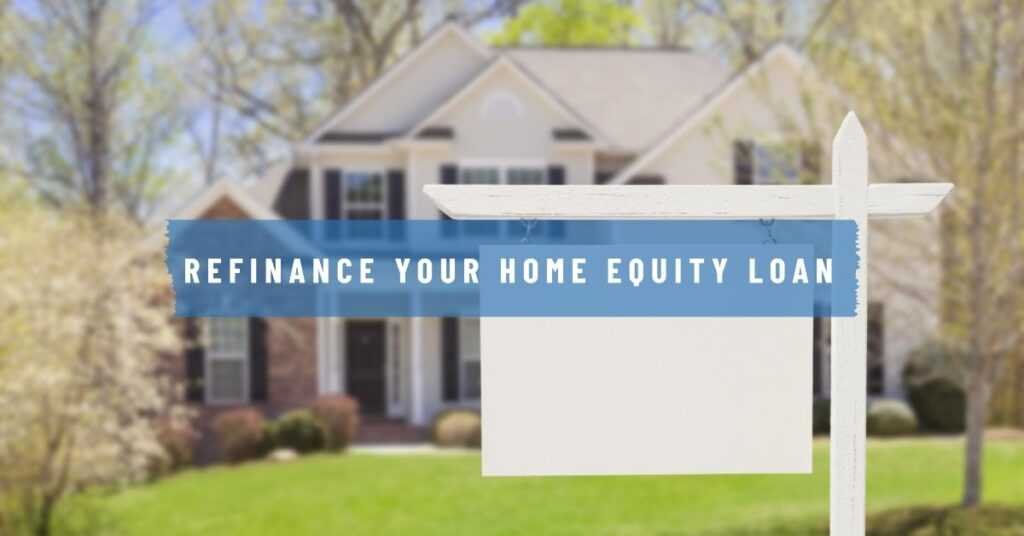Last updated on November 19, 2024
Are you caught in the web of financial uncertainties, desperately searching for a lifeline to ease the burden of your home equity loan? Well, my friend, you’re in the right place, and we’ve got the answer you’ve been hunting for: Can you refinance a home equity loan?
Life is all about finding solutions to problems, and refinancing your home equity loan could be the key to unlocking a brighter financial future. In this article, we’ll explore the ins and outs of refinancing, uncover the potential benefits, and equip you with all the knowledge you need to make an informed decision. So, let’s dive in and demystify the world of home equity loan refinancing!
The Basics: What is a Home Equity Loan?
Before we plunge into the depths of refinancing, let’s make sure we’re all on the same page. A home equity loan, also known as a second mortgage, is a loan you take out using your home as collateral. It allows you to borrow a lump sum of money, often at a fixed interest rate, and repay it over time. The amount you can borrow is determined by the equity you’ve built in your home, which is the difference between your home’s market value and the balance on your primary mortgage.
Now that we’ve got that down, let’s shift our focus to the real question at hand – can you refinance a home equity loan?
Can You Refinance a Home Equity Loan? Absolutely!
The short answer is yes, you can refinance a home equity loan, and it can be a savvy move if you play your cards right. But there are some important details you need to consider. Let’s break it down:
1. Why Refinance a Home Equity Loan?
Refinancing your home equity loan can serve several purposes, each offering its own set of advantages:
- Lower Interest Rates: One of the primary reasons people refinance their home equity loans is to secure a lower interest rate. If market conditions have shifted in your favor since you initially took out the loan, refinancing can help you save a significant amount of money.
- Changing Loan Terms: Refinancing allows you to alter the terms of your loan. You can extend or shorten the loan period, depending on your financial goals. If you’re looking to reduce monthly payments, extending the term may be the way to go.
- Access to More Funds: Need more cash? Refinancing can provide you with additional funds by tapping into the equity you’ve built in your home. This can be a lifeline for home improvements, debt consolidation, or other financial needs.
- Switching from Variable to Fixed Rate: If you have a variable-rate home equity loan, you may consider refinancing to switch to a fixed rate, providing stability in your monthly payments.
- Combining Multiple Loans: If you have multiple loans, including your primary mortgage and a home equity loan, refinancing can help you consolidate them into a single, more manageable loan.
2. The Refinancing Process
So, how does this whole home equity loan refinancing thing work? Here’s a quick rundown of the process:
- Assess Your Current Loan: The first step is to evaluate your existing home equity loan. Understand its terms, interest rate, and any associated fees. This will help you determine whether refinancing is a smart move.
- Check Your Credit Score: Lenders will scrutinize your credit score when you apply for a refinance. The better your credit score, the more likely you are to secure favorable terms. So, make sure your credit is in good shape.
- Shop Around for Lenders: Don’t settle for the first lender that comes your way. Shop around and compare offers from different financial institutions. Look for lenders offering competitive interest rates and terms.
- Submit an Application: Once you’ve chosen a lender, you’ll need to complete an application. Be prepared to provide financial documentation, such as income statements, tax returns, and details about your existing loan.
- Appraisal and Underwriting: The lender will conduct an appraisal of your home to determine its current market value. They’ll also perform underwriting to assess your ability to repay the loan.
- Closing Costs: Be aware that refinancing comes with closing costs, similar to when you initially took out your home equity loan. These costs can include application fees, appraisal fees, and title search fees.
- Approval and Funding: If your application is approved, you’ll proceed to the closing phase. Once the paperwork is finalized, the new loan will be funded, and you can start enjoying the benefits of your refinanced home equity loan.
3. Factors to Consider
Refinancing isn’t a one-size-fits-all solution, and there are some crucial factors to take into account:
- Interest Rates: Keep an eye on the interest rate environment. If rates are lower than what you currently have, it may be an excellent time to refinance.
- Fees and Closing Costs: Don’t forget about the fees associated with refinancing. Make sure the potential savings outweigh the costs.
- Loan Term: Consider the impact of changing your loan term. While extending the term can reduce monthly payments, it may increase the overall cost of the loan.
- Credit Score: A higher credit score can open doors to better refinance options. If your credit has improved since taking out your home equity loan, you might be in a strong position to refinance.
- Equity in Your Home: The more equity you have in your home, the better the refinancing terms you can secure. Lenders generally prefer borrowers with a higher equity stake.
How to Qualify for a Home Equity Loan Refinance
Refinancing any type of loan involves applying for a new loan and using the proceeds to pay off the old one. However, merely having the old loan does not automatically make you eligible for a refinance. To qualify for a home equity loan refinance, you need to meet certain criteria:
1. Adequate Collateral
For a home equity loan, your home serves as collateral to secure the loan. Most lenders require a combined loan-to-value (CLTV) ratio of no more than 85 percent. This means the sum of all your outstanding home-backed debts, including your primary mortgage and home equity loan, should be no more than 85 percent of your home’s total value. In other words, you should own at least 15 percent of your home free and clear.
2. Financial and Credit Requirements
You need to meet personal financial and credit requirements. This typically includes having at least a fair credit score, starting at 580. However, many lenders require a minimum of 620 for refinances. Home equity loans tend to have stricter standards due to their secondary mortgage status, so the higher your credit score, the lower the interest rate offered.
3. Debt-to-Income Ratio (DTI)
A low debt-to-income ratio (DTI) is crucial. Your monthly bills should generally comprise no more than 43 percent of your monthly gross income.
4. Good Repayment Record
A good repayment record with your current home equity loan is important, especially if you intend to refinance with the same lender. Timely payments, consistency, and reliability in your borrowing history can work in your favor.
Keep in mind that a drop in your home’s value since you initially obtained your home equity loan may affect your eligibility for a refinance. This is more likely to occur during a significant softening of the residential real estate market or if you did a cash-out refinance that depleted your home’s equity.
Home Equity Loan Vs Refinance Cash-Out
Both a home equity loan and a cash-out refinance allow homeowners to tap into the equity in their homes, but they are different financial products with distinct features and considerations. Let’s compare a home equity loan and a cash-out refinance to help you understand their differences and when each might be a more suitable option for your financial needs:
Home Equity Loan:
A home equity loan, also known as a second mortgage, is a loan that allows you to borrow a lump sum of money using the equity you have in your home as collateral. Here are some key characteristics of a home equity loan:
- Lump Sum: With a home equity loan, you receive a one-time lump sum of money, typically at a fixed interest rate.
- Fixed Terms: Home equity loans often have fixed terms, meaning you’ll make regular payments over a set period, usually 5 to 30 years.
- Predictable Payments: Since the interest rate is fixed, your monthly payments remain consistent, making it easier to budget.
- Interest Deductibility: In many cases, the interest on a home equity loan can be tax-deductible if the funds are used for home improvement purposes. However, tax laws may change, so it’s essential to consult with a tax professional.
- No Impact on First Mortgage: Taking out a home equity loan doesn’t affect your primary mortgage.
- Ideal for Specific Expenses: Home equity loans are often used for specific purposes like home renovations, debt consolidation, or major expenses with a clear cost in mind.
Cash-Out Refinance:
A cash-out refinance involves replacing your existing mortgage with a new one that is larger than your current loan balance. The difference between the new loan amount and your old mortgage balance is given to you as cash. Here are key features of a cash-out refinance:
- New Mortgage: A cash-out refinance creates a new, larger mortgage that pays off your existing mortgage and provides you with additional funds.
- Adjustable or Fixed Rates: You can choose between adjustable or fixed interest rates for the new mortgage.
- Combined Payments: Your old mortgage and the additional funds are combined into one new mortgage, which may have different terms and interest rates.
- Tax Benefits: Mortgage interest on the entire loan amount is typically tax-deductible if the funds are used for qualifying purposes.
- Potential Impact on First Mortgage: A cash-out refinance can affect the terms and interest rate of your primary mortgage.
- Versatility: You can use the funds from a cash-out refinance for various purposes, such as home improvements, debt consolidation, investments, or other financial needs.
Choosing Between a Home Equity Loan and a Cash-Out Refinance:
Home Equity Loan:
- Choose a home equity loan if you want a lump sum of money with predictable monthly payments.
- Ideal for specific, one-time expenses where you know the exact amount you need.
- If you want to keep your existing primary mortgage intact and have a clear plan for using the funds.
Cash-Out Refinance:
- Consider a cash-out refinance if you want to refinance your primary mortgage and access a larger amount of money.
- Suitable when you prefer to have a single mortgage payment and are open to adjusting your primary mortgage’s terms.
- When you have multiple financial goals or need funds for various purposes.
The choice between a home equity loan and a cash-out refinance depends on your financial goals, preferences, and your unique situation. It’s advisable to consult with a financial advisor or mortgage specialist to determine which option aligns best with your needs and long-term financial plans.
The Benefits of Refinancing a Home Equity Loan
Now that we’ve tackled the “can you refinance a home equity loan” question head-on, let’s explore the exciting benefits that come with it!
1. Lower Monthly Payments
Refinancing often allows you to secure a lower interest rate, which can significantly reduce your monthly payments. That extra money can be redirected towards other financial goals or simply provide you with more breathing room in your budget.
2. Savings Over Time
Reducing your interest rate isn’t just about lower monthly payments. It’s also about long-term savings. Over the life of your loan, even a slightly lower interest rate can translate into thousands of dollars saved.
3. Flexibility in Loan Terms
Refinancing gives you the flexibility to adjust your loan terms. Whether you want to extend the loan period for lower payments or shorten it to pay off your debt faster, the choice is yours.
4. Access to Additional Funds
By refinancing, you can tap into the equity you’ve built in your home, giving you access to a lump sum of cash. This can be a game-changer for home improvements, educational expenses, or any other financial need.
5. Simplifying Your Finances
If you have multiple loans, consolidating them through refinancing can simplify your financial life. Managing one loan with a single monthly payment can reduce stress and make it easier to stay on top of your finances.
How Often Can You Refinance A Home Equity Loan
The frequency at which you can refinance a home equity loan depends on several factors, including your lender’s policies, your financial situation, and the terms of your existing loan. Here are some key considerations to keep in mind:
- Lender Policies: Lenders have their own guidelines regarding how often you can refinance a home equity loan with them. Some lenders may allow you to refinance after a specific waiting period, while others may have no restrictions. It’s essential to check with your lender to understand their specific policies.
- Changes in Home Equity: Refinancing a home equity loan often requires you to have a sufficient amount of equity in your home. If your home’s value has increased significantly or you’ve paid down a substantial portion of your existing home equity loan, you may have more equity available for a refinance. Conversely, if your home’s value has decreased, it could affect your eligibility for a refinance.
- Financial Situation: Your financial situation, including your credit score, debt-to-income ratio, and income, plays a significant role in your ability to refinance. Lenders will assess your financial stability and creditworthiness when considering your application for a refinance.
- Loan Terms: The terms of your existing home equity loan matter. If you have a fixed-term home equity loan, you may need to wait until the loan term ends before refinancing. If you have a home equity line of credit (HELOC), you can often refinance it more frequently, but the terms may vary.
- Costs and Fees: Refinancing typically involves closing costs and fees. It’s important to consider these costs when deciding how often to refinance. Refinancing too frequently could lead to increased expenses that may outweigh the benefits.
- Your Goals: Your financial goals and reasons for refinancing also influence how often you might consider refinancing. If you want to reduce your monthly payments, lock in a lower interest rate, or access additional funds for a specific project, these goals will impact your decision.
In general, there is no strict limit on how often you can refinance a home equity loan. However, it’s crucial to assess the costs, benefits, and your eligibility each time you consider a refinance. Additionally, keep in mind that frequent refinancing may not always be the most cost-effective or advantageous strategy, so it’s important to weigh the potential benefits against the associated expenses and the impact on your financial goals. Consulting with a financial advisor or mortgage professional can help you make an informed decision regarding the frequency of home equity loan refinancing.
Can You Refinance A Home Equity Loan Without Refinancing Your Mortgage
Yes, you can refinance a home equity loan without refinancing your primary mortgage. Refinancing a home equity loan is a separate process from refinancing your primary mortgage, and it allows you to adjust the terms and conditions of your home equity loan without affecting your first mortgage. Here’s how you can refinance a home equity loan without touching your primary mortgage:
- Contact Your Current Lender: Start by getting in touch with your current home equity loan lender. Let them know that you’re interested in refinancing your home equity loan. They can provide you with information about the refinancing process and the options available to you.
- Shop Around: While it’s a good idea to start with your current lender, it’s also wise to shop around and explore offers from other lenders. Different lenders may have varying terms and interest rates for home equity loan refinances, and you may find a more favorable deal elsewhere.
- Application Process: When you’ve chosen a lender or lenders to work with, you’ll need to go through the application process. This typically involves providing documentation of your financial situation, credit history, and the details of your existing home equity loan.
- Appraisal and Underwriting: The lender may require an appraisal of your home to determine its current value. The underwriting process will assess your financial qualifications to ensure you meet the lender’s criteria for the refinance.
- Closing: Once your application is approved, you’ll go through the closing process, similar to when you initially obtained your home equity loan. This includes signing the necessary documents and paying any associated closing costs.
- Receiving Funds: After closing, you’ll receive the funds from the new home equity loan. These funds can be used for various purposes, such as paying off your existing home equity loan, funding home improvements, or other financial needs.
- Repayment: With your new home equity loan in place, you’ll make monthly payments according to the new loan terms. These terms could be different from your previous loan, so be sure to understand and budget for the changes.
It’s essential to remember that refinancing your home equity loan does not affect your primary mortgage. The primary mortgage remains in place with its existing terms and conditions. The home equity loan refinance is specific to the second mortgage or home equity loan.
Before proceeding with a home equity loan refinance, carefully review the terms, interest rates, and any associated fees to ensure it aligns with your financial goals and provides the benefits you’re seeking. Consulting with a financial advisor or a mortgage specialist can be helpful in making an informed decision about refinancing your home equity loan.
FAQs: Your Burning Questions, Answered!
Now, let’s tackle some of the most pressing questions you might have about refinancing a home equity loan.
Can I refinance my home equity loan if my credit isn’t perfect?
Absolutely! While a good credit score can help you secure better terms, there are lenders who work with borrowers with less-than-ideal credit. You may not get the rock-bottom interest rates, but refinancing can still be an option.
How much can I borrow through a home equity loan refinance?
The amount you can borrow through a home equity loan refinance is typically based on the equity you’ve built in your home. Most lenders allow you to borrow up to 85% of your home’s appraised value, minus the balance on your primary mortgage.
What is the difference between a home equity loan and a home equity line of credit (HELOC)?
A home equity loan provides a lump sum of money with a fixed interest rate, while a HELOC is a revolving line of credit with variable interest rates. When you refinance a home equity loan, you’re essentially taking out a new loan with different terms, whereas a HELOC allows you to draw funds as needed within a credit limit.
Are there tax benefits to refinancing a home equity loan?
In most cases, the interest paid on a home equity loan refinance is tax-deductible, just like the interest on your primary mortgage. However, tax laws can change, so it’s advisable to consult a tax professional to ensure you’re eligible for deductions.
How long does the home equity loan refinance process take?
The refinancing process can take anywhere from 30 to 45 days on average. However, it can vary depending on the lender, your specific circumstances, and any hiccups that may arise during the process.
Can I refinance if I have an existing home equity loan and primary mortgage?
Yes, you can refinance if you have both a home equity loan and a primary mortgage. In fact, consolidating these loans through refinancing can make your financial life more manageable.
Conclusion: Embrace the Power of Home Equity Loan Refinancing!
So, can you refinance a home equity loan? Absolutely, you can, and it’s a move that can open up a world of financial possibilities. Whether you’re looking to reduce monthly payments, save on interest, access extra funds, or simplify your finances, home equity loan refinancing is a tool at your disposal.
Just remember to do your homework, shop around for the best offers, and consider your unique financial situation and goals. With the right approach, you can unleash the full potential of your home equity and take control of your financial future. So go ahead, explore the world of home equity loan refinancing, and watch your financial dreams become a reality!





